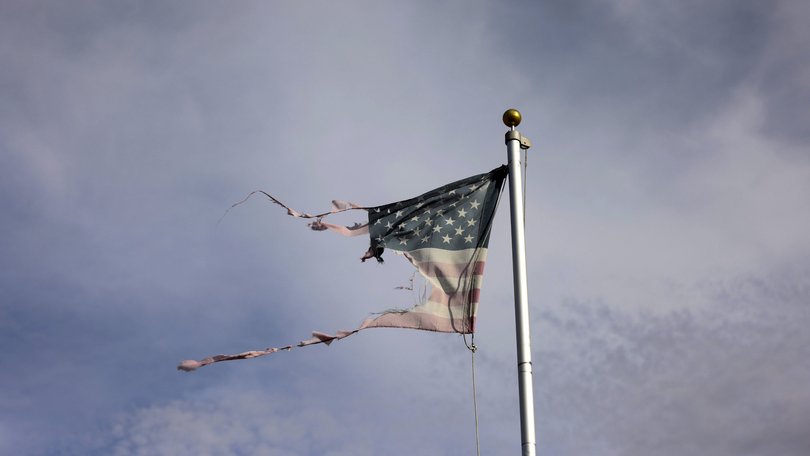THE NEW YORK TIMES: Trump’s perversion of justice has reached a new phase

President Donald Trump’s Justice Department is turning civil rights enforcement upside down.
Last week, Harmeet Dhillon, the assistant attorney general for civil rights, asked a federal judge to sentence a former Louisville police officer named Brett Hankison to one day in prison. Last year, a Kentucky jury convicted Hankison of violating Breonna Taylor’s civil rights when he fired multiple rounds from his handgun into her apartment on the night the police killed her.
The Taylor case was one of a series of dreadful killings of unarmed Black Americans that helped touch off America’s racial reckoning in 2020. It was also a paradigmatic example of the way flawed systems interact with reckless police conduct to create fatal injustice.
Sign up to The Nightly's newsletters.
Get the first look at the digital newspaper, curated daily stories and breaking headlines delivered to your inbox.
By continuing you agree to our Terms and Privacy Policy.In the early morning hours of March 13, 2020, police officers gathered outside Taylor’s apartment door. They had obtained a no-knock search warrant based on allegations that a suspected drug dealer named Jamarcus Glover had received packages at Taylor’s home. Glover and Taylor once had a relationship, but Taylor was not the target of the warrant.
The police on the scene were instructed to knock, even though they had a no-knock warrant. And here’s where the stories of witnesses start to diverge. Officers at the scene say they knocked and announced that they were the police. The early 911 calls indicate that neighbors didn’t know the police were present.
In fact, in initial statements made after the raid, not a single neighbor reported having heard the police identify themselves. One witness initially said the police did not announce themselves, but later changed his story and claimed he heard the police identify themselves.
Taylor was in the apartment with her boyfriend, a man named Kenneth Walker. He testified that they were startled by a loud pounding on the door, and he said he never heard the police announce themselves. Concerned that the pounding might be coming from an intruder, he grabbed his gun, which he owned lawfully, and approached the door.
At that point, the police chose to forcibly enter the home and broke the door down. Walker, fearing a home invasion, fired and hit an officer. The police returned fire. They didn’t hit Walker, but they did hit Taylor, fatally wounding her. The injustice is staggering. She was innocent, she was unarmed, and she was gunned down in her own home.
So far, the story is more tragic than criminal. The police were serving a lawful search warrant. Walker was a lawful gun owner, and Kentucky’s so-called castle doctrine gave him a legal right to use deadly force if he had “reason to believe” that a person was unlawfully and forcibly entering his home.
At the same time, the police officers had their own legal right to return fire. Obviously, if a police officer is shot at, he can fire back to preserve his life. If that was the entirety of the case, then no charges should have been filed against anyone — not against Walker, who thought shadowy figures had just broken down Taylor’s door, and not against officers who were under fire.
In one of the terrible quirks of American law, because each of them was exercising his right to self-defense, the officers and Walker were essentially engaged in a legal gunfight.
But not Brett Hankison. As Rukmini Callimachi, my newsroom colleague, reported in 2020, Hankison “shot blindly into Breonna Taylor’s apartment from dozens of feet outside in the parking lot.” He fired 10 shots, three of which passed through the wall and slammed into a neighboring apartment, where a pregnant woman lived with her son and partner.
Hankison’s bullets didn’t hit Taylor, but his indiscriminate use of force violated her rights. The Louisville police department fired him in June 2020, and the termination letter said that his actions that night were “a shock to the conscience.”
Kentucky state prosecutors brought a wanton endangerment case against Hankison, but a state jury acquitted him of the charges in March 2022. Federal prosecutors obtained a civil rights indictment against Hankison, claiming that he had violated Taylor’s civil rights through the use of excessive force.
The first federal trial ended in a hung jury. The Biden Department of Justice tried him again and secured a conviction in November.
In her filing requesting a one-day sentence, Dhillon argued that the “jury’s verdict will almost certainly ensure that defendant Hankison never serves as a law enforcement officer again and will also likely ensure that he never legally possesses a firearm again.”
In other words, he’s suffered enough.
It’s hard to read those words — dripping with sympathy for an officer who wrongly used deadly force, endangering innocent people in two different apartments — at the same time that the Trump administration has been sending immigrants who’ve been convicted of no crimes at all into indefinite confinement in brutal and inhumane conditions overseas.
Here’s the key point: Trump’s corruption of justice isn’t just individual; it’s categorical. We have grown accustomed to him rewarding his loyalists and punishing his critics. That he fired the prosecutors who worked on his federal criminal cases while pardoning the Jan. 6 rioters represents a textbook case of individual favoritism.
The Trump administration’s abuse of the civil rights division is something else entirely. It had already initiated a “litigation freeze” on filing new civil rights cases, and it had indicated that it was even going to reconsider previous settlements and consent decrees intended to address police misconduct.
There is nothing inherently wrong with a new administration evaluating the actions of the old, but if that evaluation is resulting in perverse miscarriages of justice — as it is in Hankison’s case — then the very purpose of the civil rights division is being subverted, right before our eyes.
Civil rights laws are designed in part to protect innocent citizens — including, of course, innocent citizens from minority communities — from unjust government officials. Here, the legal world is turned upside down. The Justice Department is using its civil rights division to protect an unjust government official who violated the civil rights of an innocent individual.
It’s hard to describe how thoroughly Trump is disrupting and corrupting our system of justice. At every turn, the pattern is the same. His friends catch a break, and his foes get the boot. The same week that Dhillon intervened on behalf of Hankison, the Trump administration fired Maurene Comey, an assistant US attorney who helped prosecute Jeffrey Epstein, Ghislaine Maxwell and Sean Combs.
Comey wasn’t given a detailed explanation for the termination, but she’s the daughter of James Comey, the former director of the FBI, one of Trump’s most hated foes.
Also last week, the Senate Judiciary Committee voted — as Democrats walked out in protest — to advance the nomination of Emil Bove III to serve as a judge on the federal Court of Appeals for the 3rd Circuit. Bove is one of Trump’s former criminal defense lawyers, and in Trump’s second term, he’s been one of Trump’s key loyalists in the Department of Justice.
Bove is the man who fired the January 6 prosecutors. He ordered the Justice Department to dismiss the political corruption case against Mayor Eric Adams of New York in exchange for his cooperation with Trump’s immigration enforcement agenda. A whistleblower claims that in meetings Bove signaled his readiness to defy orders from federal courts, a claim he denies.
The judge in Hankison’s case, Rebecca Grady Jennings — a Trump appointee — does not have to accept Dhillon’s recommendation. She has the power to hold the line and impose a just sentence for Hankison’s criminal acts.
Even if she does the right thing, though, we can’t rely only on judges to preserve our system of justice. That isn’t how the system is supposed to work. Each branch of government has its own constitutional obligations. In the best of times, even a good president has too much power to be adequately restrained by the judicial branch alone.
But these are not the best of times. Donald Trump is determined to transform America’s system of justice into his personal political weapon, and now Breonna Taylor’s family bears the fresh pain of a new and terrible miscarriage of justice.
This article originally appeared in The New York Times.
© 2025 The New York Times Company
Originally published on The New York Times
